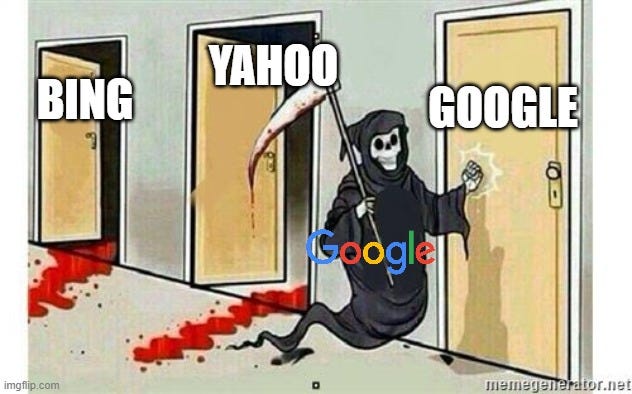Google Is Killing Its Own SEO
One of the most surprising shifts in 2025 is what’s quietly happening inside Google Search. According to recent studies, over 60% of all Google searches now end without a click — meaning users get their answers directly on the results page without visiting a third-party website.
Where do those clicks go?
Most of the time, nowhere — because Google now gives you everything you need right on the page. When a summary box, knowledge panel, or AI answer instantly delivers what you were looking for, there’s no reason to leave.
But it gets crazier. Of the remaining searches that do result in clicks, the majority lead to another Google-owned property — like YouTube, Google Maps, or Gmail or a paid ad! In fact, only about 36% of clicks now land on an external, third-party website.
So, if 60% of searches result in no click, and of the 40% remaining, only 36% of them are organic link clicks, That means less than 15% of all Google searches today result in an organic click to an outside website, a number that’s almost certain to keep falling over the next few years.
Why Would Google Do This?
Many marketers are asking: Why is Google killing its own SEO?
The answer is simple — Google isn’t in the business of sending you elsewhere anymore.
Their goal is no longer to help you “find” the right website. Their goal is to give you the right answer immediately — on their platform, in their ecosystem. And if that answer happens to come from a sponsored result, all the better for their bottom line.
This shift makes perfect sense strategically. Google built a trillion-dollar empire on website rankings and keyword relevance, but they know the world of search is fundamentally changing. Users are no longer just “searching.” They’re asking.
They’re asking ChatGPT, Grok, Perplexity, Gemini, Meta AI, and Copilot for answers directly — without ever opening Google. If Google forces users to click through multiple pages and sites to piece together an answer, those users will just stop coming back.
So instead, Google’s doing what any smart incumbent would: They’re cannibalizing themselves before someone else can.
They’re choosing to “eat themselves” rather than be eaten by the next generation of AI-driven platforms.
The SEO Era Is Ending
As someone who’s both practiced SEO and spent over $8–9 million a month on Google Ads, I’ve seen this shift up close. The reality is clear — you can’t build your entire marketing strategy around Google SEO anymore.
Ranking #1 on Google today doesn’t mean what it did five years ago. That blue link might sit below a massive AI summary, a map pack, a “People Also Ask” box, or four ads — and even if you’re lucky enough to get a click, it’s from a shrinking pool of users.
The real battlefield now is AI-driven search — the new layer of discovery happening across platforms like ChatGPT, Gemini, Grok, Perplexity, and Meta.ai.
That’s where people are asking questions, getting context, and making decisions — often before they ever touch a browser.
Welcome to the AIO Era
We’ve entered the age of AIO — Artificial Intelligence Optimization.
Just as businesses spent the past two decades mastering SEO for Google, the next decade will be about optimizing for AI systems that interpret, summarize, and recommend content.
Google’s not killing SEO out of desperation.
They’re doing it out of survival — adapting faster than most realize.
Because they know that in the future of search, the only thing that matters is who gives the best answer first.


